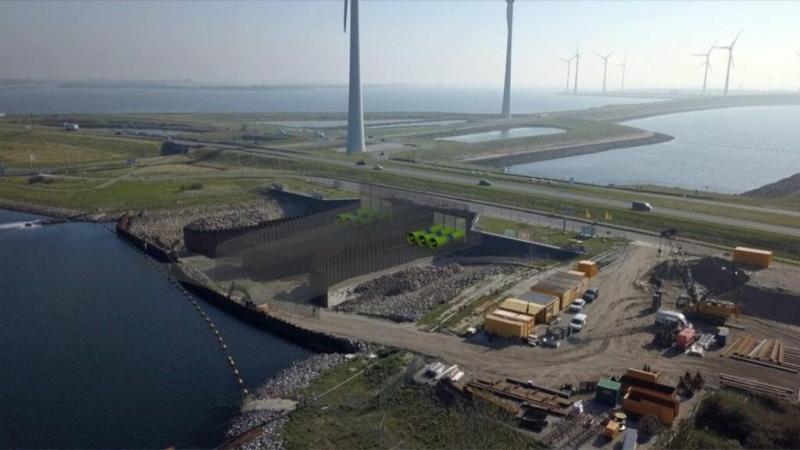A new consortium of international companies has been established under the name of Climate Power Plant Zeeland with the aim of building and operating a tidal power plant in the Dutch province of Zeeland.
 Artist’s impression of the Climate Power Plant Zeeland in the Grevelingendam (Courtesy of Pentair Nijhuis/with permission from BT Projects)
Artist’s impression of the Climate Power Plant Zeeland in the Grevelingendam (Courtesy of Pentair Nijhuis/with permission from BT Projects)
Artist’s impression of the Climate Power Plant Zeeland in the Grevelingendam (Courtesy of Pentair Nijhuis/with permission from BT Projects)
Led by Director of MET-Support, Peter Scheijgrond, the consortium brings together the Australian investment bank Macquarie, engineering firm Antea Group, contractor Van der Straaten, and turbine technology manufacturers Pentair, and Water2Energy.
The initial goal of the consortium is to build a 1.6 MW tidal power plant at a set of discharge gates in the Grevelingendam – a dam forming a part of the Dutch flood defense system in Zeeland, and at the same time to improve the water quality of the Grevelingen Lake, according to Scheijgrond.
The tidal power plant would be equipped with six fish-friendly turbines that could provide green electricity for more than 1000 Dutch households.
The project forms an important stepping stone for the validation of tidal turbines for a large-scale tidal power plant in the Brouwersdam and other future concepts such as Delta21 and Dynamic Tidal Power.
It would be built on the location of the planned Tidal Technology Center Grevelingendam (TTC-GD), for which Rijkwaterstaat – the executive agency of the Ministry of Infrastructure and Water Management in the Netherlands – withdrew the consent back in July 2020.
The TTC-GD has been under construction since 2018, before it was shut down, as the project developer BT Projects faced financial troubles and was unable to complete the scheme.
The Rijkwaterstaat might demolish the three flow channels that were built as part of the TTC-GD, unless a suitable developer is found to continue the project.
The idea of a tidal test site on the premises has not been abandoned either, Scheijgrond said, as the proposal includes the possibility for other turbine manufacturers to rent one of the ducts to test their own turbines.
The initiative also foresees close cooperation with ongoing research of the Delta Power group of the HZ University of Applied Sciences and future Delta Knowledge Centre for Energy, Water and Food.
However, to make the plans a reality, an investment from the government might be necessary, according to Scheijgrond, who hopes to establish a private-public partnership to drive the initiative forward.
This article is reproduced at www.offshore-energy.biz